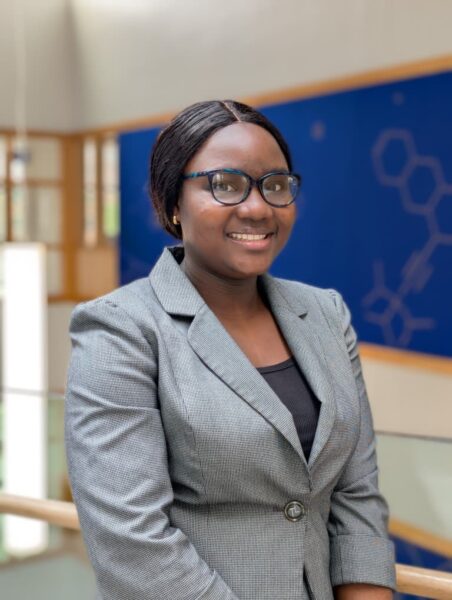News
Nigerian Scientist Leads Global Effort to Tackle Water Pollution

In a world increasingly threatened by contaminated water and chemical pollution, a young Nigerian scientist is standing at the forefront of innovation.
Motunrayo Oladele, a doctoral researcher and Principal Investigator at the University of Kentucky in the United States, is leading pioneering studies to make clean water accessible, affordable, and sustainable across the globe.
Oladele’s work blends chemistry, engineering, and environmental science to confront one of the most persistent challenges of the 21st century, the removal of emerging pollutants that endanger both ecosystems and human health.
Her NSF-funded research focused on converting stillage, a byproduct of bioethanol production, into engineered biochar materials for soil and water remediation. The project demonstrated how agricultural and industrial residues can be transformed into sustainable adsorbents that capture and degrade harmful contaminants, providing a low-cost and environmentally friendly solution for pollution control.
Building on this success, Oladele is now pioneering the use of aerosolized microdroplet technologies, an emerging frontier in chemistry to accelerate pollutant degradation at the air-water interface. This new approach has the potential to redefine how scientists design and deploy chemical processes for cleaner water and a safer environment.
“Water contamination is a shared global crisis, one that threatens both public health and national security,” she explains. “My goal is to design low-cost, high-efficiency systems that can clean water for communities.”
Her studies address chemicals and trace contaminants found in industrial effluents, agricultural runoff, and drinking-water sources, substances increasingly classified by global agencies as emerging pollutants due to their persistence and toxicity. The broader objective of her work aligns with the United Nations Sustainable Development Goal 6 (Clean Water and Sanitation) and the U.S. Environmental Protection Agency’s efforts to modernize water infrastructure.
Oladele’s leadership extends far beyond the laboratory. She serves as a Coordinator for the American Chemical Society’s Graduate Student Symposium Planning Committee (GSSPC), an elite team that organizes national symposia for the world’s largest chemistry society.
In this role, she contributes to shaping scientific dialogue around sustainability, innovation, and environmental chemistry. She has also been recognized as a Student Representative for the Eastern Analytical Symposium, one of the most respected scientific meetings in North America.
Additionally, she serves as a peer reviewer for major international journals such as Springer Nature and PLOS One, including Scientific Reports (a journal published under Nature Portfolio, part of Springer Nature) and ACS Omega, where her expert evaluations help uphold rigorous global standards of scientific excellence.
Beyond research, Oladele is deeply committed to STEM outreach and mentorship. She has coordinated numerous science-education initiatives, served as a judge at regional and national science fairs across multiple U.S. states, and mentored young scholars who have gone on to win academic awards and secure graduate placements. Her outreach work exemplifies her belief that impactful science must also inspire and empower future generations.
Originally from Oyo State, Nigeria, Oladele graduated as the Best Student in Chemistry from Olabisi Onabanjo University, where she received multiple awards for academic excellence.
Her early research on bioactive compounds and water purification earned her national recognition, setting the stage for her later achievements in the United States.
Her recent accolades include the Max Steckler Award for outstanding research performance, the People’s Choice Award and Second Place Award at the University of Kentucky’s Graduate Teaching Showcase, and the Champion of Service Award from Serve Kentucky.
She currently serves as a Lead Teaching Assistant in Organic Chemistry at the University of Kentucky, where she received the Outstanding Teaching Assistant Award for her exceptional instructional leadership.
“What drives me,” she says, “is the belief that environmental solutions should not stay trapped in the lab. They should reach the people who need them most, from rural communities in Nigeria to industrial cities in the U.S. My passion is to make science truly serve society by teaching, mentoring, and inspiring others to innovate for a healthier, more sustainable world.”
In her bid to become a professor and global leader in environmental chemistry, Oladele continues to push boundaries by conducting cutting-edge research, mentoring the next generation of scientists, and promoting science outreach that connects innovation to real-world impact.
Her vision is rooted in sustainability, equity, and innovation, symbolizes a new generation of Nigerian scientists making significant strides in leading global research organizations and shaping the world’s response to pollution and climate change.













